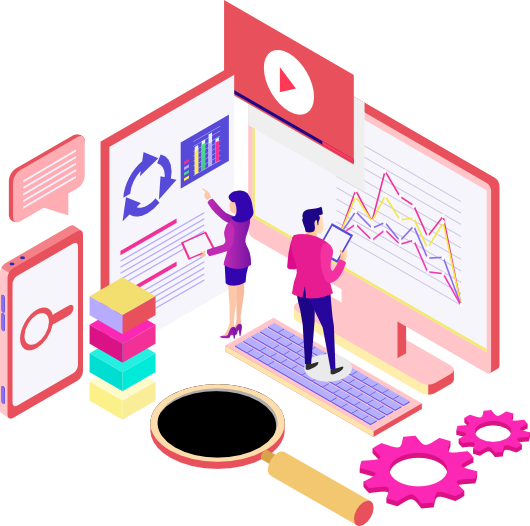Our advice is to enlist the expertise of a digital marketing agency to enrich your SEO efforts to prevent missed opportunities for expanding your reach and accelerated growth. By opting for professional assistance, you can generate better leads, sales, brand exposure, and profits while keeping your expenses under control compared to alternative campaigns.
SEO (Search Engine Optimization) is a new-age digital marketing tactic used to boost the visibility and ranking of a website on search engine results pages (SERPs). It helps potential customers find websites when they search for specific products or services. A higher ranking in search results enhances traffic, quality leads, and sales.
SEO services include on-page, off-page, technical, local, mobile, and eCommerce SEOs. On-page SEO optimizes web pages to rank better, while off-page SEO improves visibility through external channels like backlinks, social media, and influencer marketing. Technical SEO sets technical aspects to improve search engine crawlability and indexability.
SEO can be a long or short-term strategy. The results can take several months to materialize. If done right, you will see quick improvements in search rankings and organic traffic. The timeline can vary depending on factors like industry competition, website quality, resources invested in SEO, and the strategy’s effectiveness.
The success of SEO campaigns can be measured through various metrics such as organic traffic, search engine rankings, click-through rates (CTRs), conversion rates, and revenue generated from organic searches. These simple metrics help us calculate the effectiveness of the strategy and suggest improvement areas.
White hat SEO is ethical and legal SEO practices that follow search engine guidelines and best practices, including website content creation, building quality backlinks and offering positive user experience. Black hat SEO uses unethical methods to trick search engines into ranking a website higher. Keyword stuffing, cloaking, and buying links are some examples.
Keyword involves identifying and targeting relevant and high-traffic keywords for your business segment. SEO experts use keyword research tools to analyze search volume, competition, and relevance of potential keywords. They also consider the buyer’s journey and search intent to target keywords that sync with the needs and preferences of the target audience.
Content optimization ensures website content is relevant, high-quality, and optimized for search engines. SEO professionals conduct keyword research and incorporate target keywords into website copy, meta tags, and headers. They also make content easily readable and organized, include internal and external links, and provide value to the user.
Link building involves procuring high-quality backlinks from external websites to improve a website’s domain authority and visibility. Backlinks are key ranking factors for search engines. They establish a website’s credibility and authority in a particular industry or niche and improve search rankings, organic traffic, and brand awareness.
Local SEO optimizes a website for location-based searches aimed at local customers. Backlinking, optimizing a website for local keywords, creating and optimizing local business listings, and building local citations are some methods used for this strategy. Local SEO differs from traditional SEO by prioritizing local search.














